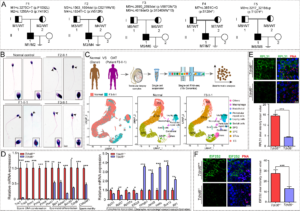TDRD6 (Tudor domain-containing 6), plays a crucial role in spermiogenesis and male infertility by maintaining the structural integrity of chromatoid bodies (CBs) and regulating post-meiotic gene expression in mice. However, the association between the TDRD6 variants and human infertility remains unclear due to limited sample size. We reported bi-allelic TDRD6 variants in five unrelated Chinese individuals with oligoasthenoteratozoospermia (OAT), including homozygous loss-of-function variants in two consanguineous families. Through single-cell RNA-seq analysis, our findings reveal that TDRD6 regulates mRNA metabolism processes, particularly involved in spermatid differentiation and translation. Our study confirms the causal relationship between TDRD6 variants and human OAT while shedding light on the poor ICSI outcomes in individuals harboring bi-allelic TDRD6 variants, thereby providing insights for potential clinical treatment strategies. (By Dr. Rui Guo, https://jmg.bmj.com/content/early/2024/02/09/jmg-2023-109766 )
Bi-allelic variants in chromatoid body protein TDRD6 cause spermiogenesis defects and severe oligoasthenoteratozoospermia in humans
(Visited 238 times, 1 visits today)
